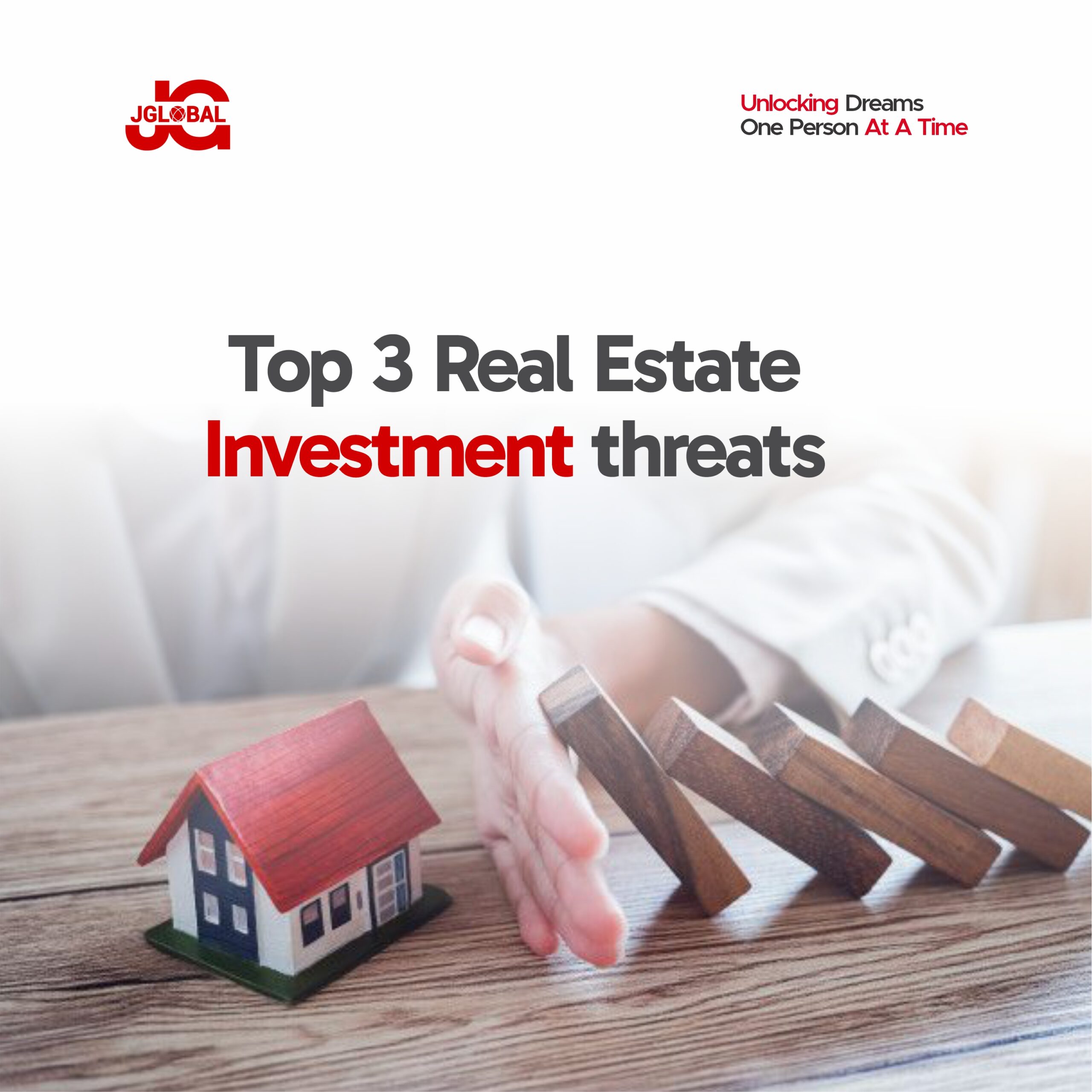Top 3 Real Estate Investment Threats in Nigeria (2025)

Introduction
If you’ve been paying attention, you already know Nigeria’s real estate market in 2025 is full of exciting opportunities. From new housing estates springing up in Lagos to mega infrastructure projects like the Lagos-Calabar Coastal Highway, it looks like a great time to invest. But as promising as all this growth sounds, there are also real estate investment threats in Nigeria 2025 that every smart investor needs to be aware of.
Real estate isn’t just about buying land or property and watching the value go up. It’s also about knowing what could go wrong and preparing for it. From legal issues to land disputes and the rising cost of building materials, some serious risks could affect your returns if you’re not careful.
In this post, we’re breaking down the top three real estate investment threats in Nigeria 2025. We’ll keep it simple, practical, and straight to the point with no legal jargon or sugarcoating. If you’re a first-time buyer, a developer, or a diaspora investor looking back home, this guide will help you spot the red flags and invest with your eyes wide open.
Threat 1: Legal and Regulatory Instability
One of the major real estate investment threats in Nigeria 2025 is the complex and often confusing legal system surrounding land ownership.
A. Complexity of Nigeria’s Land Tenure System
In Nigeria, land ownership operates under two main systems: statutory and customary. The statutory system is governed by formal laws and requires official documentation, while the customary system is based on traditional practices and local customs. This duality often leads to overlapping claims and disputes, as there’s no centralized record keeping. As a result, investors may unknowingly purchase land with contested ownership, leading to legal battles and potential loss of investment.
B. Inconsistent Government Enforcement
Government policies on land use and ownership can change unexpectedly, posing another real estate investment threat in Nigeria 2025. For instance, the Federal Capital Territory Administration (FCTA) recently announced plans to reclaim over 4,700 properties in Abuja due to unpaid ground rents, some dating back over 40 years. This move affects both individuals and institutions, highlighting the risks associated with policy shifts and enforcement actions.
C. Administrative Bottlenecks
Obtaining necessary documents like the Certificate of Occupancy (C of O) or Governor’s Consent can be a lengthy and frustrating process. Delays in processing these documents can stall development projects and tie up capital for extended periods. In some cases, the process can take several months or even years, depending on the state and the efficiency of the land registry.
D. Mitigation Strategies
To navigate these challenges:
- Verify Land Titles: Always conduct thorough due diligence by checking land titles with the appropriate land registry and consulting with the surveyor-general’s office.
- Engage Legal Experts: Work with lawyers who specialize in real estate to ensure all transactions comply with current laws and to help navigate the complexities of land ownership systems.
- Stay Informed: Keep abreast of policy changes and government announcements related to land use and ownership to anticipate and mitigate potential risks.
By taking these proactive steps, investors can better protect themselves against the legal and regulatory real estate investment threats in Nigeria 2025.
Threat 2: Land and Property Disputes
Another significant real estate investment threat in Nigeria 2025 is the prevalence of land and property disputes. These disputes can arise from various issues, including multiple ownership claims, boundary disagreements, and conflicts between developers and buyers.
Can Digital Land Registration Solve Nigeria’s Land Title Disputes?
A. Multiple Claims to Ownership
In Nigeria, it’s not uncommon for a piece of land to be sold to multiple buyers by individuals known as “Omo-onile.” These are local landowners or families who claim ancestral rights to land and may resell the same plot to different people, leading to legal battles and financial losses. A report indicates that 87% of land disputes in Lagos courts involve Omo-onile activities.
Inheritance disputes are also prevalent, especially when property owners pass away without a will. Family members may contest ownership, leading to prolonged legal processes.
B. Boundary and Encroachment Issues
Boundary disputes occur when the exact limits of a property are unclear, leading to overlaps with neighboring lands. Such issues can halt construction projects and complicate financing, as banks are hesitant to provide loans for disputed properties.
Even state governments are not immune; for instance, Lagos State recently brought a boundary dispute with Ogun State before the National Boundary Commission.
C. Disputes Between Developers and Buyers
Off-plan property purchases, where buyers invest in properties before they’re built, can lead to disputes if developers fail to deliver on time or deviate from agreed specifications. Such disagreements can escalate to legal battles, with buyers seeking refunds or compensation.
D. Community and Family Disputes
Conflicts can arise when land sold by one family member is contested by others who were not consulted. Additionally, communities may resist developments on lands they consider ancestral, leading to tensions and potential project delays.
E. Mitigation Strategies
To navigate these challenges:
- Conduct Independent Surveys and work with professional in the real estate industry: Before purchasing land, hire a certified surveyor to verify boundaries and ensure there are no overlaps. Also, engage a real estate professional.
- Obtain Governor’s Consent or Court Vesting Orders: These legal documents affirm your ownership and can protect against future disputes.
- Include Conflict Resolution Clauses in Contracts: Ensure that sales agreements have clear terms for resolving disputes, such as arbitration clauses, to avoid lengthy court battles.
By taking these proactive steps, investors can better protect themselves against the land and property-related real estate investment threats in Nigeria 2025.
Threat 3: Economic Volatility and Cost Inflation
Economic instability is one of the most pressing real estate investment threats in Nigeria 2025. From the fluctuating value of the naira to soaring inflation rates, these factors significantly impact both developers and investors.
A. Currency Devaluation and FX Dependency
The naira has experienced significant depreciation, recently trading above ₦1,700 to the US dollar. This devaluation increases the cost of imported construction materials, making building projects more expensive. For diaspora investors, the weakening naira means that remittances have less purchasing power, affecting their ability to invest in real estate back home.
B. Inflation’s Pressure on Affordability
Nigeria’s inflation rate surged to 31.7% in February 2025, leading to increased prices for construction materials like cement and steel. As a result, property prices are climbing, especially in cities like Lagos and Abuja, where demand is high but affordability is shrinking. Rent is also increasing, but in low-income areas, inflation is pushing tenants out.
C. Limited Access to Finance
High-interest rates, with the Monetary Policy Rate (MPR) at 27%, make mortgages less accessible for middle-income buyers. Developers are also affected, as the cost of borrowing increases, limiting their ability to finance new projects. This situation hampers the growth of the real estate sector and makes homeownership more challenging for many Nigerians.
D. Mitigation Strategies
To navigate these economic challenges:
- Invest in Budget/Mass Housing: Focusing on affordable housing projects can ensure consistent demand, even during economic downturns.
- Use Locally Sourced Materials: Reducing reliance on imported materials can help manage construction costs and mitigate the impact of currency fluctuations.
- Portfolio Hedging with FX-Denominated Real Estate Instruments: Investing in properties or financial instruments that are denominated in foreign currencies can protect against naira depreciation.
By implementing these strategies, investors can better protect themselves against the economic volatility and cost inflation that pose real estate investment threats in Nigeria 2025.
What Is FX?
FX stands for foreign exchange, and it refers to the conversion of one currency into another — for example, changing US dollars to Nigerian naira.
In the context of real estate (or any investment), FX risk or FX exposure happens when the value of your investment is affected by fluctuations in exchange rates.
For example:
- A diaspora investor sending money from the U.S. to Nigeria will get fewer naira if the naira weakens too much.
- A developer buying imported materials (e.g., tiles, roofing sheets, elevators) in dollars will spend more naira if the exchange rate rises.
So when we talk about FX-denominated investments, it means putting your money into assets priced in foreign currency (like USD or GBP), which helps protect your returns from naira depreciation.
Conclusion
There’s no doubt that Nigeria’s real estate market in 2025 still holds a lot of promise but as we’ve seen, it’s not without its risks. The real estate investment threats in Nigeria 2025 are real, and they’re affecting both new and experienced investors.
From legal grey areas and land disputes to the ripple effects of inflation and currency instability, these challenges can cost you time, money, and peace of mind if you’re not prepared. But the good news? With the right knowledge and strategies, you can navigate these threats and still make profitable, secure investments.
Here’s a quick recap:
- Legal and regulatory instability means you must verify titles, engage professionals, and stay alert to policy changes.
- Land and property disputes make due diligence and legal documentation non-negotiable.
- Economic volatility and cost inflation highlight the importance of affordable housing projects, local materials, and FX-smart investments.
Remember, the goal isn’t to scare you away from investing, it’s to help you do it wisely. Knowledge is your biggest asset in this market.
If you’re planning your next move, take the time to ask the tough questions, work with trusted professionals, and stay informed. That’s how you turn risk into reward in today’s real estate landscape.



